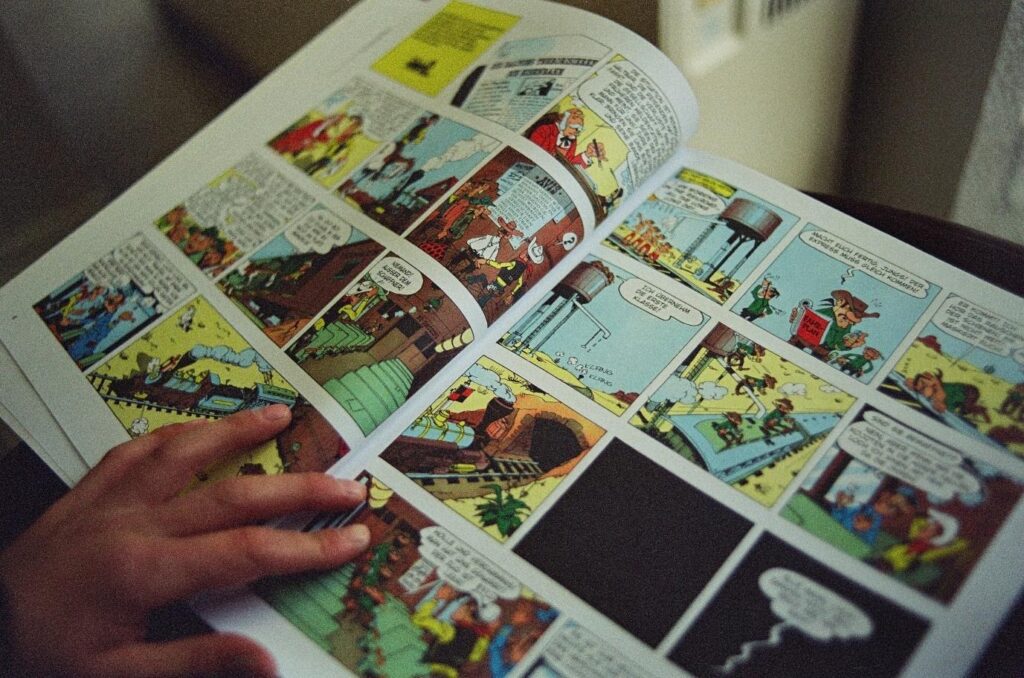The possibilities of using comics in elementary and higher education are diverse and numerous. It can be a motivation for experiencing a literary work, a fuller understanding of grammatical categories, spelling rules, or feedback on what has been read. The comic encourages students’ reading perception, and its composition develops a perception for separating the key segments represented by image and text. In the modern age dominated by digital media, it deserves a special place in teaching to strengthen the book’s value.
Comics Make You Smarter
After many years of studying the impact of reading comics on the human brain, language experts have concluded that this activity makes us smarter. “From the perspective of traditional education, learning a language involves reading a script, memorising phonetics and, in the last step, translating it into speech”, says Elijah Smaltz, an education expert who writes for PapersOwl also adding that “but now we know that there are better ways to improve language skills and that a method based on text and speech is not the only option”.
Visual languages in comics have been present in our society for decades. They have played an essential role in a classroom by developing reading, communication, and cognitive functions from the very beginning.
Visual Learning Improves Brain Activity
In a paper entitled “Webcomics, Multimodality, and Information Literacy”, comic book theorist Dale Jacobs explains that reading comics is a much more complex process than traditional learning opportunities and therefore requires more brain activity. An additional advantage is that the vividly coloured panels and illustrations easily attract students’ attention.
Traditional printed picture comics are complex multimodal texts that consist of linguistic and visual, auditory (visually presented), gestural and spatial elements. We promote literacy when we read the best comics, especially children.
By relying on the available resources, we find the meaning in word combinations, images, space organisation, sound effects, panel composition, gestures, facial expressions, and other elements. Reading comic books is, therefore, an active process. The theory of multimodality explains how readers penetrate the meaning of the story and how they create their own identity.
Effective Way of Creating Ethical Values
The Chinese people once brought the achievements of their revolution closer to their students through the comics world. Also, the fighters of the Popular Front for the Liberation of Angola adored the famous Italian hero and dreamer about the freedom of Corto Maltese so much that they celebrated him as a hero and living person, a kind of their Che Guevara.
There is no better form than graphic novels to show the struggle of good and evil. Although it looks fun, comic books effectively achieve educational goals and give students ethical values. Teachers extract moral messages from school materials and show them through drawings.
The comic “Prince Valiant” by American screenwriter and cartoonist Harold Foster is a real piece of art. Students can learn English and valuable history and ethical lessons and understand medieval castles, knightly tournaments, and weapons through it.
Multiple Application Possibilities
Comics have multiple possibilities of application, from linguistic and literary to creative. Although one should be careful when choosing content, comics offer opportunities to create a dynamic educational process.
Comic books can bring to life the once monotonous content, enrich the imagination, connect multiple areas and subjects into one whole (for example, history-art-literature-media). Thus, they may develop creativity and encourage ideas in students, especially if they create literary works themselves.
From a psychological point of view, graphic novels have a positive effect because students gain knowledge faster through observation and remember it more easily. Unlike sometimes incomprehensible or uninteresting texts, they can enrich the experience, motivate, and arouse interest in a particular topic. It is also stimulating for teachers as creators and originators of the problems of a specific area or creativity in students’ linguistic and literary expression.
The comic opens the possibility for the cooperation of teachers, students, and experts and the opportunity for guest appearances and project teaching. By choosing appropriate content, both experience and education can be more exciting and better with comics.
Therapeutic Role of Comic Books
The therapeutic role positively affects the psyche. Students are also exposed to intellectual and physical stress, and it is not easy for them either (to be good, better, and best). Wouldn’t Calvin and Hobbes, Prince Valiant, Asterix come to them as a well-deserved relief after a hard day?
Comic therapy is natural relief and refreshment! Some teachers think that comics can help eliminate and resolve conflicts in checking and determining knowledge. Some again say that comics develop a research spirit, so it is decided early on what to do and which way to go after primary school. It is a great help to the student in analysing and synthesising something more challenging to understand.
The comic life is motivating, popular, attractive, constant, and perfectly applicable in all subjects at school! It challenges the visualisation of what is read stimulates our thinking. Moreover, students have learned to perceive time-space because time and space are the same in the world of comics.
Conclusion
In the past, students needed paper and ink for their work, and the teacher required a blackboard, chalk, and books. Today, whether mandatory or only desirable, the choice of learning methods has increased. The classic textbooks are supplemented by various materials, including comic books.
Comics are not just mindless fun in students’ free time since they play a vital role in popular culture and society. Thanks to science, we know that they make us more intelligent and pass information efficiently to any student. If you find yourself thinking about important life issues because of HBO’s “Watchmen,” be sure to look for graphic novels of the same name. You will not regret it.

